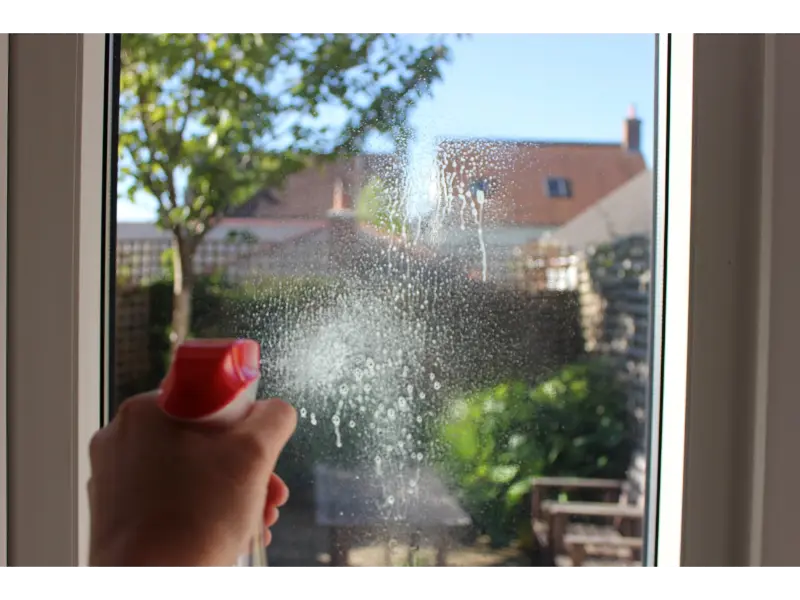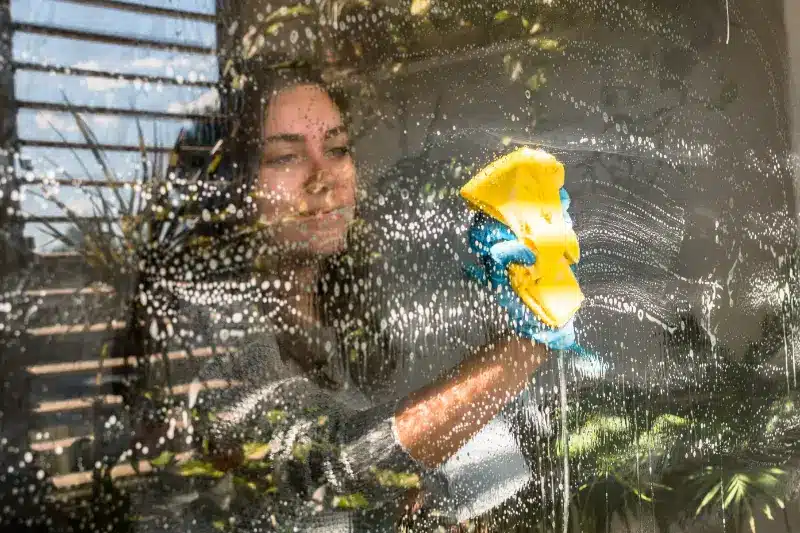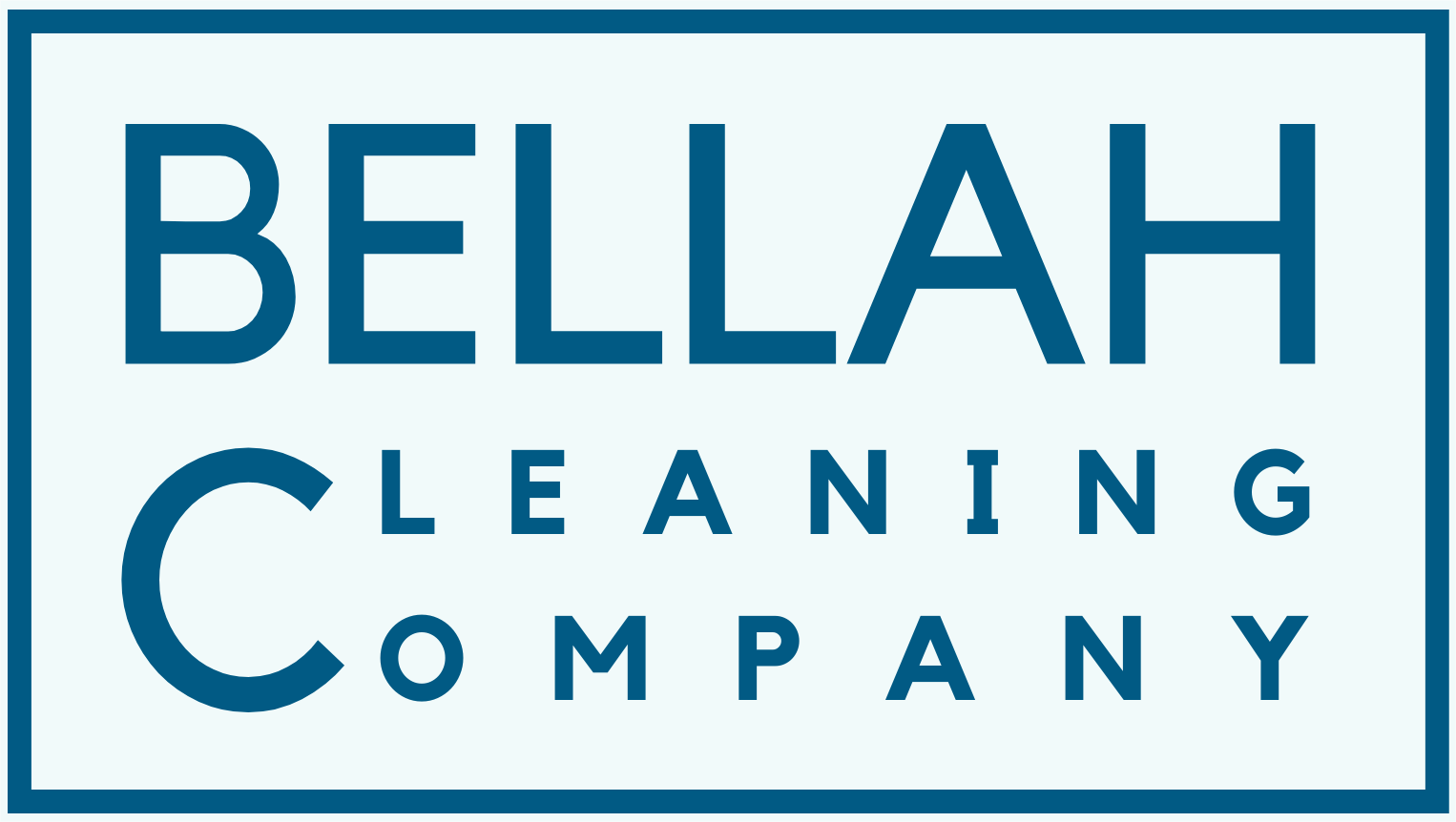Are you wondering if bleach is safe for your glass windows? Despite some misconceptions, does bleach damage glass? The answer is no. Bleach does not inherently damage glass. However, its use requires specific precautions to prevent residue build-up that could affect clarity and shine. In this article, we delve into the best practices for using bleach on glass without causing damage, offering insights into chemical interactions, dilution ratios, and step-by-step cleaning guides.

Key Takeaways
- Bleach is safe for glass windows and won’t etch the surface, but it should be thoroughly rinsed off to avoid residue that could dull the shine.
- Use diluted bleach (3 tsp bleach to 3 cups water) for effective cleaning, and mix fresh solutions daily since bleach decomposes into salt and water over time.
- For non-chemical clean, eco-friendly options like hydrogen peroxide or a 50/50 vinegar-water solution can effectively clean windows without leaving a chemical footprint.
The Truth About Bleach and Glass Windows
Gleaming glass windows can brighten up any room, reflecting the sun’s rays and offering a view of the world outside. But when it comes to keeping them clean, there’s a common household item that’s often a topic of heated debate—bleach. Does it spell disaster for your windows, or can it be an ally in the battle against grime? Dispelling common fears, bleach does not etch glass surfaces, making it safe for chemical use on glass.
However, failing to rinse it off thoroughly can leave a residue that hinders the desired shine.
Understanding Chemical Reactions
Discussing cleaning agents and glass involves delving into chemical reactions, which occur when substances interact and potentially alter their structures or properties. Chlorine bleach is known for its reactive nature, but when it comes to glass, the interaction is surprisingly inert. In other words, chlorine bleach and glass get along just fine with no adverse effects on the integrity of your windows.
The Role of Concentration
Safely harnessing the power of bleach is all about controlling the potency of the solution. To avoid irritation and protect surfaces, dilution is key—a simple concoction of 3 cups of water to 3 teaspoons of bleach is all it takes to tackle mold on glass windows without any unwanted drama. Keep in mind that bleach solutions are akin to Cinderella—they don’t last forever.
To maintain effectiveness, whip up a fresh batch daily, as the active ingredients gracefully bow out into salt and water over time.
Best Practices for Using Bleach on Glass
When reaching for the bleach, opt for the unscented household variety containing 5%- 9% sodium hypochlorite, which is essentially pure bleach. Steer clear of specialized bleaches not intended for disinfection. The golden ratio? Mix 5 tablespoons (1/3 cup) of bleach per gallon of room-temperature water or 4 teaspoons per quart for a potent yet safe cleaning solution.
But before you set your sights on disinfecting, pre-clean the glass with a soap-based household cleaner to remove any organic residue. Follow these steps to disinfect your glass properly:
- Read and follow the application guidelines on the bleach bottle.
- Keep the window visibly wet with bleach for at least a minute.
- Rinse the window thoroughly.
This will ensure your glass transitions from grimy to gleaming without the unwanted autograph of bleach residue.
Preparing Your Space for Safe Cleaning
Setting the stage for safety is paramount before embarking on your cleaning expedition. Whether you’re dealing with moldy window frames or just the usual dust and dirt, protective gear is non-negotiable. Don’t use those rubber gloves and a face mask to shield yourself from any bleach backlash.
Bear in mind that a small amount of bleach can be highly effective. A gentle mix of 1/2 cup of bleach to a gallon of water should do the trick, ensuring a safe and effective bleach solution for cleaning.
Protecting Surrounding Surfaces
Think of yourself as an artist about to paint a masterpiece—you wouldn’t want to splatter the surrounding area. Similarly, when cleaning with bleach, safeguarding nearby surfaces is crucial. Use plastic sheeting or old towels to keep your floors, furniture, and décor bleach-free.
Pay special attention to porous materials and those prone to discoloration, as they’re particularly vulnerable to bleach.
Ventilating Your Cleaning Area
Cleaning with bleach requires proper ventilation. Here are some tips to ensure a safe cleaning experience:
- Flung open those windows and doors to ensure a breath of fresh air can circulate through your cleaning area.
- Bring in fans, if you have them, to help escort any bleach fumes promptly out the door.
- Without proper ventilation, you risk turning your cleaning spree into a noxious affair, as bleach can react with water and other substances to form harmful fumes.
Alternatives to Bleach for Window Cleaning
Although bleach is a powerful ally, it isn’t the only effective option for cleaning your glass windows. If you’re looking for a gentler approach or prefer eco-friendly options, you’re in luck. Hydrogen peroxide, for instance, is a non-toxic disinfectant that breaks down into harmless water and oxygen, making it a safe bet for your windows.
Vinegar, with its dirt-dissolving acumen and natural sanitizing properties, offers a streak-free clean without a chemical footprint. And for those tough grime duels, a tag team of hydrogen peroxide and vinegar can be a powerful, eco-conscious duo.
Vinegar: A Natural Substitute
The tangy scent of vinegar serves dual purposes—it’s not only used for salad dressing but also acts as a secret weapon for window cleaners. A simple 50/50 solution of vinegar and water can wipe away window woes when armed with a spray bottle or rag. Even the most stubborn hard water spots bow down to the might of vinegar, especially with a little soak time to let the solution work its magic.
For more tenacious mineral deposits, crank up the concentration of white distilled vinegar for a clean that’s both effective and eco-friendly.
Soap and Water: The Classic Approach
Occasionally, the most effective solutions are the simplest ones. A homemade potion of water and a dash of dish soap can rival any commercial glass cleaner in efficacy. To wield this concoction effectively, follow these steps:
- Scrub the glass with care, covering every inch.
- Squeegee from top to bottom, ensuring each stroke overlaps.
- Wipe the blade between strokes to banish streaks.
When the sun bears down, opt for cool tap water to mix with your soap. This will give you more time to work before evaporation steps in, especially in direct sunlight. Finally, for a finishing touch, use a dry microfiber cloth or chamois to polish off any lingering streaks, leaving your windows with a professional-grade sparkle.

How to Clean Windows Like a Pro with Bellah Cleaning Company
Introducing Bellah Cleaning Company, the seasoned experts in window cleanliness, boasting over a decade of expertise in Texas. Whether you’re nestled in Southlake or the bustling surrounds of Colleyville and Keller, these cleaning maestros bring their A-game to every pane.
With a trove of professional-grade equipment and a safety-first approach, they guarantee not just a clean but a conscience-clearing satisfaction. And with transparent pricing and a promise of touch-ups, if rain should dare to mar their work within 24 hours, it’s clear they stand behind their service.
Bellah’s Signature House Wash
Bellah’s house wash service reflects its commitment to environmental sustainability and preserving your home’s integrity. They wield a low-pressure wash technique, particularly for cleaning outside windows, ensuring a thorough clean without any risk of damage. The secret lies in their eco-friendly cleaning solutions, gentle yet effective against the most stubborn dirt and grime while being kind to your windows and home’s exterior surfaces.
And it’s not just windows—Bellah can rejuvenate your brickwork, stone, concrete, vinyl siding, and wood, all with the same tender care.
Pressure Washing with Precision
Although ‘pressure washing’ may suggest brute force, Bellah Cleaning Company reinterprets it with precision and finesse. Their pressure washer services are meticulously calibrated to avoid any damage to window seals or frames while still providing a deep clean that leaves glass gleaming.
And it’s not just about glass—Bellah’s adjustable pressure settings ensure that a variety of surfaces are cleansed safely and effectively, keeping even the most tenacious dirt and stains at bay.
Caring for Specialty Glass and Treated Windows
Different types of glass require different care, especially when dealing with specialty glass and treated windows. Tinted windows, for instance, are particularly sensitive and demand gentle care to prevent damage. Here are some tips for caring for tinted windows:
- Use mild liquid soaps instead of abrasive cleaners.
- Use soft cloths or non-abrasive sponges to clean the windows.
- Avoid using abrasive tools or materials that could scratch the tinted surface.
By following these tips, you can keep your tinted windows looking clean and clear without causing any damage.
It’s not just about what you use but how you use it. The ‘Solution Spray Method,’ which involves a cleaning solution and warm water applied in small circles with a microfiber cloth, is perfect for these specialized windows.
Identifying Your Window Type
Before you start your cleaning routine, take a moment to identify your window type. Low-emissivity (low-E) glass windows, for example, can be spotted by their slight metallic sheen and are prized for their energy-saving capabilities. Knowing your window type is the first step to ensuring they receive the proper care.
Customized Cleaning Solutions
For the unique needs of tinted and other specialty windows, Bellah Cleaning Company crafts bespoke cleaning solutions. They understand that routine dirt calls for a soft touch with mild detergent, while stubborn stains may require a stronger product applied with caution. Their specialized services extend to low-E and other coated windows, treated with products that protect the coating’s functionality and lifespan.
And when it comes to self-cleaning glass, they employ gentle cleaning agents to maintain the glass’s autonomic features. For those particularly persistent water spots and mineral stains, Bellah might even use super fine steel wool, ensuring your windows remain unscathed.
Maintenance Tips to Extend the Life of Your Windows
The lifespan of your windows depends not only on cleaning but also on regular maintenance. A regular cleaning routine, which includes:
- Cleaning the sills
- Cleaning the screens
- Cleaning the tracks
- Cleaning the hinges
It can stave off those tough mineral deposits and ensure your windows function smoothly. For a streak-free finish, clean on a cloudy day, use microfiber cloths for a lint-free clean, and employ a rubber-bladed squeegee to keep those streaks at bay.
Remember to clean the screens. They can be maintained with a lint roller or a gentle scrub, contributing to the overall cleanliness of your windows. For the best results, don’t forget to use a window cleaner.
Regular Cleaning Routines
Adopt a regular window cleaning schedule. It’s more than just a task; it’s a preventative measure against the accumulation of dirt and grime that can obscure your view and diminish the beauty of your home.
Preventing Mineral Deposits and Hard Water Stains
A proactive approach is the best defense against hard water spots and mineral deposits. Here are some tips to minimize the chance of these unsightly blemishes forming on your windows:
- Routinely wash your windows
- Make sure that water doesn’t linger and evaporate on the glass
- Employ a car windshield rain repellent or an oil-based cleaner to enhance the windows’ ability to shed water
By following these tips, you can reduce the potential for mineral deposits and hard water stains on your windows.
When it comes to your cleaning solutions, go for distilled water to avoid introducing more minerals that could result in streaks and deposits, ensuring clean water for your tasks.
Summary
We’ve journeyed together through the ins and outs of window cleaning, demystifying the role of bleach and unveiling the power of alternatives like vinegar and soap. With Bellah Cleaning Company’s expertise and our maintenance tips, you’re now equipped to keep your windows in pristine condition, ensuring they continue to let in the light and offer clear views for years to come.
Frequently Asked Questions
How to clean with bleach?
Mix a bleach solution and apply it to the surface with a rag or sponge. Let it sit for 5-10 minutes, then rinse with warm water and air dry for a clean finish.
How do you remove bleach residue from glass windows?
You don’t have to worry about bleach residue on glass windows. Simply clean them as usual, or sanitize them in a dishwasher at 400°F for 10 minutes to remove any traces of bleach. Easy peasy!
How does Bellah Cleaning Company ensure the safety of tinted and treated windows during cleaning?
Bellah Cleaning Company ensures the safety of tinted and treated windows during cleaning by using gentle, non-abrasive cleaning solutions and methods tailored to the specific type of window to avoid damage.
What should I do to maintain my windows and extend their lifespan?
To maintain your windows and extend their lifespan, make sure to clean them regularly, prevent water from drying on the glass, and use distilled water in cleaning solutions. This will help prevent mineral deposits and hard water stains.
